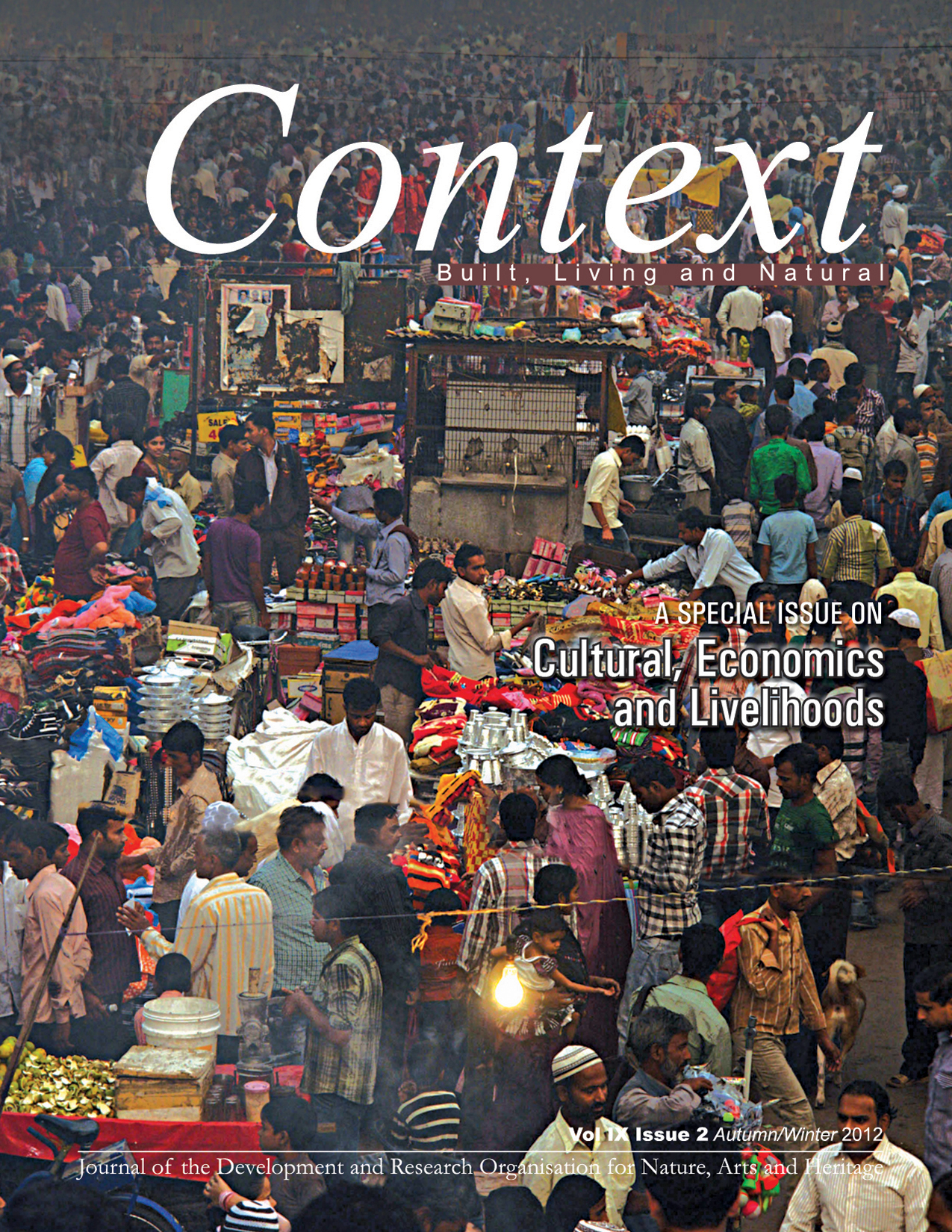Special Issue on Cultural, Economics and Livelihoods : Volume IX Issue 2
About the Volume
Over abundance of cultural heritage; be it in the form of monuments, historic cores, crafts or nuances of rites and rituals ingrained in our daily lives has made us almost immune to the value and potential of our own cultural resources. Even though our living experience entails dealing with cultural constructs in myriad forms, we tend to address its conservation and protection as an isolated entity without realising the overall socio-economic impact.
Stefania Abakerli from the World Bank talks about ‘unleashing the economic effectiveness of India’s vast cultural heritage’. She acknowledges aspects such as the contribution of craftspeople to the handloom industry and employment potential in heritage tourism sector, quoting examples ranging from the iconic Taj to the dynamic historic cores of Indian cities.
This special issue addresses the economics of historic precincts in India through case studies on revitalisation of historic bazaars and urban streets in the cities of Delhi, Hyderabad, Lucknow and Pondicherry. Presented as initiatives which focus on the socio-economics of urban historic centres across India, these provide an insight into various approaches taken by conservation practitioners, researchers, local stakeholders and communities.
The section on sustainable tourism discusses the economic impact and visitor experience through tourism initiatives including examples of urban landmarks or the lesser known rural destinations across Gujarat, Himachal Pradesh, Tamil Nadu and Madhya Pradesh. These diverse initiatives are presented as exemplary examples undertaken by a range of stakeholders involving leading non-governmental, private and public enterprises.
The long term sustainability of cultural heritage essentially rests in addressing livelihood specifically in countries such as India where traditional livelihoods are integral to socio-economic development and need to be recognised for the meaning and values that they bring to the community at large. Designing for marginalised home based artisans by micro Home Solutions as well as efforts made by the Crafts Council of India to include craftspeople in the Census data of India will go a long way in achieving livelihood objectives linked to the culture sector.
The issue additionally covers an article on contemporary culture that refers to ‘social media’ as the new tool of communication and connection in the society and explores the potential of using this tool as a means for economic sustainability of our cultural heritage.
-The Editorial Team
Contents
About the Volume
Overview
Crafting India’s Economic Growth and Development
Stefania Abakerli
Economics of Historic Precincts
The Business of Heritage: Hazratganj, Lucknow
Ashima Krishna
Sense and the City: Dynamics of economy and culture
G S V Suryanarayana Murthy and Abdul Bari
Achieving Economic Goals through Conservation: Pondicherry experience
INTACH Pondicherry
Heritage Tourism for Economic Development
Heritage Tourism Management: Service enhancement and sustainability
Sandeep Munjal and Gaurav Tripathi
Gastronomic Tourism in Old Delhi
Sanjay Sharma
Ganeshpura Village, Gujarat: An ecotourism destination
Jignasa Pandya and Neeruben Senma
Responsible Development through Tourism: Villages of Tamil Nadu
Steve Borgia
Community Based Homestays: Innovation in tourism
Seema Bhatt
Culture and Livelihoods
Traditional Livelihoods and Community Centred Urban Development
Rakhi Mehra, Mukta Naik and Greg Randolph
Rural Heritage and Economic Development: Unlocking the potential
S K Misra
Contemporary Culture: Impact and Opportunity
Social Media and its Impact on Cultural Change: Implications for Indian marketers
Meghna Rishi, Sanjeev Bhanawat and Vipul Bajaj
Heritage Album
Mata ni Pachedi: An Art Tradition
Gautam Patel and Krutika Patel
Economic Aspects of Traditional Water Harvesting
Amitangshu Acharya
Review
Progress of the Craft Economics Impact Study, 2012 : An initiative of the Crafts Council of India
Ashoke Chatterjee
Format
Economic Measurement of Urban Conservation Projects
DRONAH Foundation
Events and Conferences

